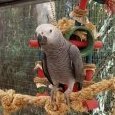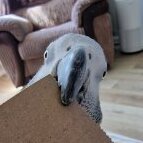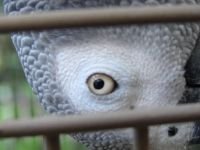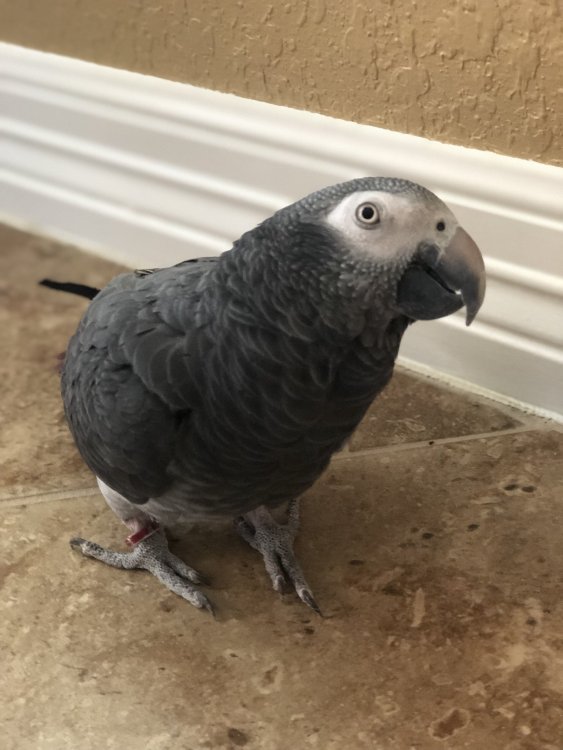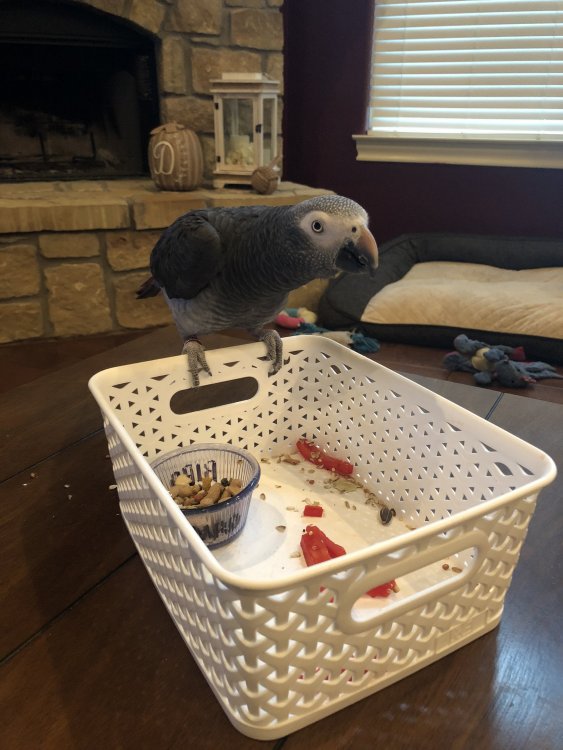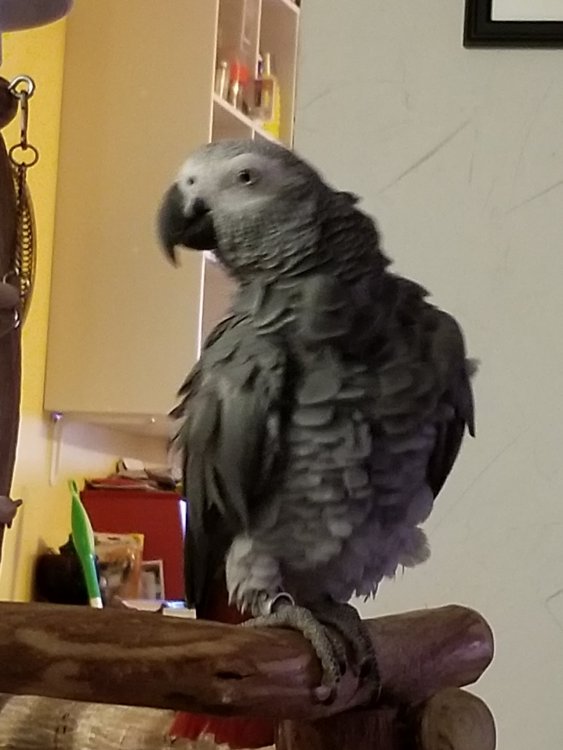NEW ADDRESS FOR MEMBERS GREYFORUMS.ORG
Leaderboard
Popular Content
Showing content with the highest reputation on 04/11/2019 in Posts
-
Thanks everyone for your help! I'm persisting with the Epsom Salts. Swelling has come down significantly, swelling on the leg has gone still has a limp and favouring the foot evry once an awhile however her demeanor his her happy self. Have deduced that the rough grit perch I recently got must have got an infection. I returned to the Pet Supply store and told them that this item should be removed from the shelves as I think it could be a hinderance. They happily took my suggestion and removed them. So will let you now how we progress .2 points
-
Jambit my African grey developed a lump on her foot over night. The previous day I had bought a new perch was rough that had grit on it. Over the week I monitored the situation she was favouring the foot however still moved around the cage with some hinderance. She was still herself interacting with everyone. I started getting concerned as the foot had a ring on it where the swelling was and took her to the vet. The vet removed the ring and gave me Doxybiotic. Over the last couple weeks not much has changed bird is the same walks around with curled claws. I give the bird a warm Epsom Salts foot bath 2x a day. The leg swelling has reduced to almost normal but the foot is still slightly swollen on the front and she does use the foot to sometimes hold food not large items. The bird has a 6th sense about medication no matter what I give she knows. I disguise with peanut, butter yogurt, potato or rice. The one index is facing the front instead of holding the back of the perch. Seems to have movement when I touch it. I can't figure how this whole incident happened and what should be my next move. Any insight would be appreciated.1 point
-
I adopted a two year old female grey, Her owners are moving to Alaska and could not take her. She was supposedly not a bitter but had experienced a issue where an adult handle her incorrectly and scared her. I have had her about three weeks. I have been giving her lots of space and letting her call the shots so to speak. I open her cage and let her come out when ready I offer my head slowly until she steps up. We will be doing fine then she will just bit me. I try not to react much but of course it hurts. I just say be a good bird. Her wings arent clipped. I dont know what to do, I really want a tight bond with her but I just not sure if I made a wrong choice buy not buying a baby.1 point
-
Well, you're further along with Dixie than I am with Huey. I can't pet Huey on the head like that without a definite hard bite. She seems to be somewhat anxious and playful at the same time. I can tell you'll get a long ways with her if you don't lose patience. Try interacting a lot with her at night just before bed time. They all seem to put their inner dinosaurs to bed early and then you're left with a cuddly Grey bird to interact with.1 point
-
Hello all! My husband and I adopted our ~9 y/o TAG, Schooner, about 7 months ago. We got (rescued) him from a family who I honestly think did not treat him well (they used welding gloves to catch him and literally throw him into his travel carrier when we came to pick him up 😳🤭😭) and I don’t know much about his early life other than he spent most of his time in his cage. I’m a marine mammal and dog trainer and am well versed in positive reinforcement, reading body language and building a good relationship with your animal. But let me tell y’all, this bird is something else! I’ve had some major success with him and I have definitely learned some of his tells. But I’m having a lot of problems with his biting. I can only ask him to step up onto my hand when he first wakes up in the morning and he’s doing that whole regurgitation song and dance. Other wise I have to wait for him to climb down his cage onto the floor and then I can pick him with this little organization box (we call it the magic box, pictured below). He’s eating well, bathing, interacting with toys and can be very vocal (mostly whistles, clicks and other vocalizations, no words). I try sooo hard to find ideal times to ask him to step up and reward him for being good and for also making it variable (if he steps up he doesn’t have to be with me forever, he can go back to his cage or he can go sit on his magic box somewhere while I read or something). But homeboy doesn’t just tag you, he grinds his beak into your skin and doesn’t let up. Ideally, I would love to find a bird trainer/grey specialist that either I can go to or can come meet him (so someone in the central Texas area?)and give me more insight on how to help this lil bird be successful. I understand that he might not ever be affectionate with me but I would like to be able to pick him up consistently and be able to move him to clean his home and socialize with him etc. Any and all advice would be appreciated! -Schooner’s Mom1 point
-
Take a look at Joanna Berger, M.Sc.🦜 (@JoannaBergerMSc): https://twitter.com/JoannaBergerMSc It might be worth speaking to and maybe booking a consultation with Joanna Berger. I follow her on twitter and she offers good advice on parrot behaviour. She can run consultations via a skype video call. Whilst I haven't had a consultation with her myself I have seen other peoples comments and videos about successful consultations with her for their parrots. She can also be emailed at animalbehaviorconsultancy@gmail.com1 point
-
Well, it took awhile but finally loaded. First, if it were me, I wouldn't keep offering my hand when she's actively showing signs of wanting to nibble/bite. Wait for her to tuck her head before approaching her. If she's reaching for you, that's not the best time to offer her your hand. I'd like to make a safety recommendation for you to consider. Her rope perches are super frayed, which is actually a huge hazard for birds. Many birds have become stuck in the hanging threads and some parronts have actually lost their babies. I'd replace those as soon as you can, ideally with non rope perches, such as manzanilla or dragonwood. Until you can change them out, you can actually trim off all those loose strands. Your baby looks like she's full of personality! Very sweet girl!1 point
-
It's not downloading for me. With grays, it's best to monitor their behaviors in real time. I have 3 grays, and watch their queues to see when they want some lovin' or to be left alone. They can start out looking for affection, but then switch mid stream. If you learn to read them, then you'll know when they'd like for you to stop doing what you're doing.1 point
-
Sorry to hear that Jambit is having a rough time with her foot! I'm afraid I can't really offer much advice. I think if you still have concerns and it doesn't look like it's getting better I would take her back to an avian vet to have it checked out again.1 point
-
I think you can upload videos to this forum? I've not tried it myself. Alternatively you could upload to youtube or another video/file sharing site and post the link. I have had Alfie for coming up on 16 years and I had him since he was 11 weeks old. I am still learning new things about him on a regular basis. They forever keep you on your toes and surprise you in new ways all the time! I wouldn't say you were doing anything wrong as such - as you are trying to introduce Dixie to her new home and allow her to integrate with the family. She will happily do this with time- it might just take her a little longer to get fully settled and comfortable with the changes first. Keep working with her and it will soon feel like she has always been a big part of your family!1 point
-
I'm trying to figure out how to record some interactions between Dixie a I hoping maybe you can look at her body language and help me understand what she is trying to tell me.1 point
-
She could have fallen or caught it on a toy when you were not looking, Greys are not a graceful bird. Did they Radio graph the leg and foot?1 point
-
He has learned from the previous peoples rough treatment that we are not a trustworthy species it will take quite a while to earn that trust back. Nothing wrong with bribes, non touching personal time-read to him show pictures(children's bright colored stories) heck sing and dance. time will eventually help heal both his psyche and your skin. You might contact Barbara Heidenreich she has some free publications and U tube videos. Wonderful advice.1 point
-
Life with a Grey makes for patience being our first lesson. Congrats on adopting a recycled bird she will enrich your days. Look forward to the progress you will make together.1 point
-
Schooner will soon be training you 🤣. Actually, sounds like it has already started! You might have your work cut out for you. Once a Grey has been mishandled, they never forget it and will carry that baggage forever. That biting down and grinding is most likely the result of being handled with gloves and learning how to bite down into them. Greys usually don't bite like that, they are a bite and release type of bird. The effects of mishandling can lessen over time but they can still be wary of things that trigger them. Our Huey (22 y.o.) was abused by a male two families before we got him and does not like men. His previous owner treated him well for 10+ years and still got the business end of Huey from time to time. We've had him for just over a year and I've made great strides with him, to the point where he will show me he doesn't want to be put down by, of course, biting the hell out of me (hoomans can be dense sometimes). Took about 7-8 months before I had my first real break-through with him so it can take a while but if you are patient it's rewarding. I'm getting better at reading Huey's body language. He does not like me banging on things in his kitchen drawer (he's the proud new homeowner here apparently) nor does he appreciate me putting up new ropes and toys in his aviary. He flew at me and bit the crap out of me just yesterday but I knew it was coming and was ready. It only took a few times before I realized what was triggering him. A nice flying bite attack helps speed up the learning process. I also have to be careful when my wife's around. She's his wife now and I've been given several eviction notices. But as much as he has it out for me, he loves to spend time with me and LOVES to be around me when I'm playing loud music and bouncing him around. Took a long time to get him to that point though. I'm just north of you (Allen). I'm not familiar with anyone down that way other than the guy who runs J.C. Aviary in Austin. You may try to contact him and see if he knows of anyone or maybe he can eval the Schooner and give some insight. Also one thing you might try is making a tight fist and bending your hand so the skin on top is nice and tight. Then offer treats for step-ups onto your fist. They have a hard time getting a nice grip on that tight skin. I had to do this with Huey for a long time till I got him stepping up without blood-letting. Schooner's a cutie pie!1 point
-
Schooner is a beauty! Sometimes the best we can do is to honor what our birds want. Biting means that you're asking him to do something he doesn't want to do. Avoiding situations that potentially can elicit a bite is one of the best approaches. It sounds as though Schooner has let you know when it's okay to pick him up. It's all about their wants; not what we need. In time it will likely improve for you. Seven months isn't really that long, especially knowing that he was previously abused by 'hand things', if you know what I mean. Your hands, whether covered or not cause him stress; hence the bites.1 point
-
Paco was on mainly a seed diet, Hartz Parrot food she bought at the grocery store. I only gave him 1/4 cup of that and introduced red, yellow, orange and green peppers, hard boiled egg, baked potato, radishes, bananas, yellow squash and brocali. Loves the pepper and banana, shreds the brocali and tosses the radishes. He nibbles and then drops the food, does this mean he does not like it or that is the way a parrot eats? He will eat the banana and the hard boiled egg. I was in a pinch to find bird food so I opted for a small bag of Wild Harvest Daily Blend for parrots. I chose this as it does not have a lot of meal in it. Dried split peas, oat groats, whole corn, wheat, soybeans, safflower seeds, carry grass, ground corn, there is a list of vitamins, de hulled sunflower seeds, no peanuts, oops take that back must be shelled, I haven't seen any. I am only giving him about a 1/4 cup and encouraging the veggies and fruit. Will pick up more today. He is now enjoying Lafeber Nutri Berries that are 23% pellet. He tossed them at first but is now eating them. Am I on the right track? I want to make sure he is getting the nutrition he needs and will try to see if I can get some samples of pellets. He has plucked his chest feathers before I got him. I have had him for a week now and have only seen 2 feathers at the bottom of the cage. He is clean now, smells better, preens, sits on one foot and stretches, getting more vocal. Thanking everyone in advance for educating me.1 point
-
I feed a base of Volkmans soak & serve and birdeez buffet. To that I will add different things: sprouts, apple, jalapeno, banana, peppers, whatever is safe frozen mixed veggies - whatever is safe in the fridge. I have had two birds come to us that were dirty and smelly and within a month or so you could see the change in their plumage and overall health. They brighten right up. If you can see the improvement in the bird, you're doing something right. Baths help too....1 point
-
Thank you for the wonderful tips. I have been going about this wrong. She loves almonds and and red grapes, I have been trying to win her over with food so I have been treating her to much. The biting started when I bring her into the living room to her wood perch. So I your right I shouldn't be taking her so far from her home cage. I'm so grateful for the help1 point
-
Am not sure, other than perhaps some of the grit from the new perch became imbedded into her foot. I'm assuming that you removed the perch after the swelling was detected? After this much time and still having some swelling, you might want to consider taking her back in so they can take another look. And yes, they do seem to know when you're attempting to disguise medication!1 point
-
Hi Snowghost! You're doing a great job introducing him to a new healthier cuisine. Foods that they can't eat are onions, garlic, chocolate and especially avocado. Radishes aren't a good choice for him, either. Soybeans, too. Birds become very used to their food and turn their beaks at new things. Many have experienced good luck by starting with his original diet and adding the good foods to that, and then reducing the bad stuff over time until only the good food remains. It's also a good idea to weigh him daily to make certain he's not losing weight while you switch him over. Many of my 13 birds don't enjoy pellets. I have had good luck with adding a little fruit juice to their Harrison's pellets, such as pomegranate juice. Greys need a rich source of Vitamin A. I give each of my fids some cooked yams daily, and also add organic environmentally safe red palm oil to their chop. Sprouting at home is another great item for them. My fids all love sugar snap peas. They love to remove the peas from the outer shells. My fids also don't like raw carrots, broccoli and green beans, so I slightly steam them before serving. Welcome to Greyforum!1 point
-
Hi Peggy and welcome to the fourms! Thank you for taking in a rescue grey! First of all, these birds operated in what we call "grey time". This is the time it takes for an individual bird to accept changes in their environment- be it a new food, new toys, new people, new cage etc etc. Every bird is different and will accept changes at their own pace. Trying to force the issue will cause a fear response and will damage the relationship with your bird. So it is absolutely critical to observe the birds responses and start learning a bit about their body language. Body language in grey's is quite subtle at times and sometimes we don't always notice it. A bird can be trying to tell us a lot through their body language and we totally miss it, so the last resort is a bite to get their message across. Your bird has just had a massive change to their lifestyle. Did you know or interact with your bird at all before bringing her home? If not then absolutely everything in her life has been tipped upside down and she is probably still adjusting to changes. New home, new flock, new environment, new routines... it's a LOT to take in! She will need some time and space to adjust to all these changes. But she will get there and she will accept you as part of her flock. At two years old, she is still a very young bird so I have no doubt that given enough time you will build a wonderful bond with her. Do you know what her favourite treat is? If not, try offering her lots of different foods and treats until you find one or two she REALLY likes. So for example, if she really likes almonds, do not feed them as part of her daily diet- keep them as rewards. You can then use that favourite treat as a reward for good behaviour - this is positive reinforcement. So if she steps up, she gets a piece of almond (not a whole one - save whole ones for REALLY good work). Do not move away from the cage at this point- just get her stepping up regularly. Always let her go back to her cage or a perch if she wants to at this point. You can then start rewarding her for staying on your hand. Again, use a piece of almond not a whole one. If she's still comfortable and content on your hand for a few more moments, she gets another piece. If she's still doing really well and making no attempt to leave, maybe go ahead and give her a whole piece. Again, always give her the option of getting back to her cage. As she is clipped and maybe unable to fly then always give her the option to retreat back to her cage, as she doesn't have a flight option. Keep talking to her whilst she is on your hand - make it sound like a good thing and sound excited about it. Tell her about all the places she will be able to go with you if she stays on your hand rather than going back to the cage. Make it a fun and positive experience for her. Once she has mastered this (and it may take some time) then SLOWLY start moving her a little further away from her cage. Reward her for staying calm. If she bites, do not take it personally (even when it hurts!) and just calmly return her to her cage and back off. Keep using pieces of whatever her favourite treat is. Only reward with a whole treat occasionally. This helps to keep the bird motivated to work towards the big treat. Or if she has a couple of favourite treats, find out which she likes better and use that as the special treat. Keep these training sessions short to begin with. She might not have had much structured training so it might take her a little while to figure out what's going on. Get her to repeat the behaviour successfully a few times then stop. You can slowly extend this if she is willing- but as soon as she shows sign of boredom (or goes for a bite) then back off and let her return to where she is comfortable (a perch or her cage) Do keep us updated with any progress. We would also love to see photos of her if you are able to.1 point
-
It's so cute hearing them practice. I rarely know what Alfie is trying to say until he comes out and says it. But he rarely talks when I'm in the room with him, so I have to listen in when he's practicing to see if I can pick out what he's learning! Since getting an Amazon echo he has been practicing more regularly. He picked up 'Alexa' within a month or so and says it often with gusto. So Alexa works as a little spy, as she will record what he mumbles at her afterwards. I can then play back the recordings and see if he's coming up with new words. 😂 I've also done a couple of remote training courses at home recently. Alfie was listening in as I was in the same room as him. He started mumbling along with the instructor at one point and had picked up the different accent (the training course was based in Manchester). So all his mumbles that day had a slight Mancunian twang to it. It was very amusing!1 point
-
My baby, who turns one in a few weeks, has discovered the phrase, 'Hello bird' which he's picked up from our eclectus. He says it over and over and over again. I love to see how he practices things until he masters them. So endearing!1 point

